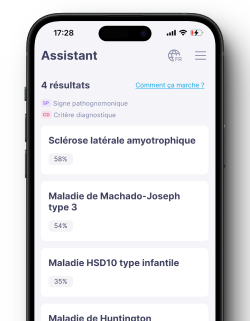📲 Download RDK for free now
Download RDK
Health professionals
What is a rare disease ?
A disease is considered "rare" if it affects a small number of people, less than one person in 2000. The term rare disease is therefore somewhat paradoxical: in France, it affects 3 million people, or 1 in 20. It affects 30 million people in Europe and between 300 and 400 million people worldwide. 1,2,3

Rare Disease Impact
Rare diseases are not rare, and although each rare disease can be considered rare individually, their global impact affects millions of people.
There are more than 6,000 rare diseases worldwide. About 80% of rare diseases are genetic, affecting patients from childhood. Others can be caused by viral or bacterial infections, autoimmune diseases, environmental factors, etc. As most of these diseases are genetic, half of them affect children under the age of 5 and are responsible for 10% of deaths between the ages of 1 and 5. The other half appear in adulthood, such as Huntington's disease, amyotrophic lateral sclerosis or Charcot-Marie-Tooth disease.1,3,4
Once diagnosed, the management of rare diseases is extremely complex, as the majority are orphan diseases for which there are no treatments. Currently, 95% of rare diseases have no curative treatment. In the absence of treatment, the role of patient associations, networks and healthcare professionals is crucial in providing the best possible information and support to patients and their families.1
Diagnostic wandering
Although some rare diseases, such as cystic fibrosis and Duchenne muscular dystrophy, are well known to healthcare professionals, their sheer number and diversity make diagnosis complex and can take several years. Diagnostic wandering is defined as the period between the appearance of the first symptoms and the moment when a precise diagnosis is made. In France, the average period of diagnostic wandering for rare diseases is 4 years. This time can be critical for patients who are diagnosed too late and whose symptoms can worsen to the point of becoming disabling. A rapid diagnosis can slow down the progression of the disease and improve the patient's psychological state and quality of life.4
Unfortunately, diagnostic errors are all too common, leaving patients to face isolation, uncertainty and lack of understanding from those around them. In fact, one third of patients feel that they have been subjected to one or more diagnoses, inappropriate treatments or even treatments that make their disease worse before the right diagnosis is made. These figures underline the importance of referring patients quickly to centres of expertise in rare diseases.5
The Rare Disease Knowledge® application
The Rare Disease Knowledge® application, co-developed by Tekkare and Orphanet, aims to reduce the number of times patients are left in the dark when it comes to diagnosing rare diseases. The application uses Orphanet's database and algorithms to support frontline healthcare professionals when they are in doubt about a patient's pathology. The aim is to develop a culture of doubt: "What if it's a rare disease ?" Adopt the reflex of thinking about rare diseases to identify them and direct the patient to the appropriate centre of expertise.
RDK Free download
Sources
Discover RDK
Your assistant in the fight against diagnostic errancy of rare diseases
Free download
Available on web, iOS, and Android
